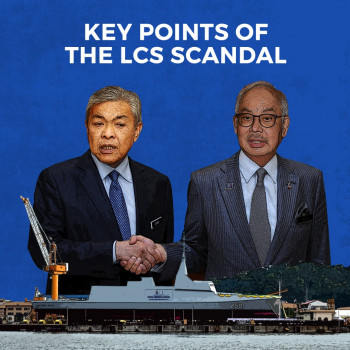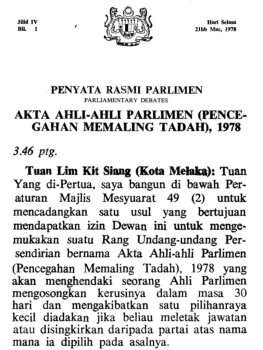By Ong Kian Ming
BN is not unique in the universe of dominant party regimes which have held power for a long period of time through less than democratic means including the conduct of elections which were neither free nor fair.
Malaysians would be familiar with the Kuomingtang (KMT) regime in Taiwan, which finally lost power in its 2000 presidential elections. Most would be less familiar with the Institutional Revolutionary Party (IRP) which ruled Mexico for 71 years until it lost power in its 2000 presidential elections or the Socialist Party in Senegal which ruled for 39 years after it gained its independence in 1961 or the Colorado Party in Paraguay which ruled for 61 years until it lost its presidential elections in 2008.e
At the height of their powers, these parties and the governments which they controlled seemed invulnerable but when forces beyond their control forced greater liberalization into the political landscape, the inevitability of them losing power became obvious to many. Here in Malaysia, we too are at a point where the prospect of the end of BN’s grip on power is growing more likely by the day. Indeed, that day may likely come in the next general election, Malaysia’s 13th since independence.
I propose SEVEN reasons for the inevitability of the end of BN’s time in power.
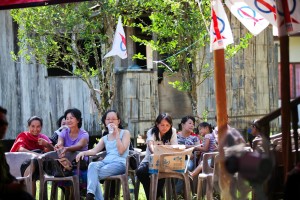 FIRSTLY, for the first time in Malaysian history, there is a viable Malay opposition which receives broad based support. In previous elections in Malaysia, even when the Malay opposition did well (namely PAS), it was often overshadowed by DAP, which held the position of the leader of the opposition from 1974 until 1999 and again in 2004. And even when PAS led the opposition in 1999, its support base was largely in the northern states of Kedah, Kelantan and Terengganu. 25 of the 27 parliament seats won by PAS were found in these three states. And only 1 out of 5 seats won by the then Keadilan was not in Kelantan or Terengganu (Wan Azizah’s victory in Permatang Pauh in Penang being the exception).
FIRSTLY, for the first time in Malaysian history, there is a viable Malay opposition which receives broad based support. In previous elections in Malaysia, even when the Malay opposition did well (namely PAS), it was often overshadowed by DAP, which held the position of the leader of the opposition from 1974 until 1999 and again in 2004. And even when PAS led the opposition in 1999, its support base was largely in the northern states of Kedah, Kelantan and Terengganu. 25 of the 27 parliament seats won by PAS were found in these three states. And only 1 out of 5 seats won by the then Keadilan was not in Kelantan or Terengganu (Wan Azizah’s victory in Permatang Pauh in Penang being the exception).
The 2008 general election threw this established pattern on its head. 7 out of PAS’ 23 parliament seats were in the urban and semi-urban areas in Perak, Selangor and KL. Parti Keadilan Rakyat (PKR) won 23 out of its 31 seats outside Kedah, Kelantan and Terengganu. 12 out of these 23 seats were won by Malay PKR candidates. And after the Permatang Pauh by-election, we finally had a Malay opposition leader who was a consensus Prime Ministerial candidate for the opposition parties – Anwar Ibrahim.
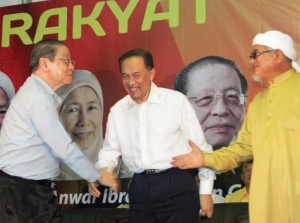 SECONDLY, for the first time in Malaysian history, the Malaysian public has seen how the Pakatan Rakyat (PR) coalition can work together be it at the state government level in Penang, Kedah and Selangor (and for a time, Perak) as well as the opposition at the federal level. While there have been some hiccups along the way, there is widespread acknowledgement of the good job which PR has done, particularly in the states of Penang and Selangor.
SECONDLY, for the first time in Malaysian history, the Malaysian public has seen how the Pakatan Rakyat (PR) coalition can work together be it at the state government level in Penang, Kedah and Selangor (and for a time, Perak) as well as the opposition at the federal level. While there have been some hiccups along the way, there is widespread acknowledgement of the good job which PR has done, particularly in the states of Penang and Selangor.
At the federal level, we have seen PR come together to propose two alternative budgets as well as Buku Jingga, a roadmap for how PR would govern at the federal level. PR MPs have come together to jointly attack the BN on various policy fronts and to present a united policy stance on various issues such as the opposition against Lynas and the support for Bersih.
The Malaysian public has also seen the rise of a new generation of PR leaders such as Nurul Izzah, Dr. Dzulkefly Ahmad, Khalid Samad, Anthony Loke, Tony Pua and Teo Nie Ching, all of whom would do a better job than any of the current crop of cabinet members in the BN government. The issue of whether PR can rule effectively in government has become less and less of a concern with each passing day.
 THIRDLY, the post GE2008 political landscape has revealed that the three fixed deposit states of Johor, Sarawak and Sabah are no longer guaranteed wins for the BN (which won 80 out of 83 seats in these three states).
THIRDLY, the post GE2008 political landscape has revealed that the three fixed deposit states of Johor, Sarawak and Sabah are no longer guaranteed wins for the BN (which won 80 out of 83 seats in these three states).
The public support for the opposition in Johor has grown significantly, especially among the non-Malays, as evidenced by the many successful fund raising dinners held by DAP and PKR. With PAS Vice President, Salahuddin Ayub, leading the charge, together with other high profile PR leaders, in this state, BN’s chances of maintaining its dominance in this state has evaporated.
In Sarawak, PR continues to build on the momentum of the state elections where it won an unprecedented 15 state seats. The parliament seats in the urban areas of Kuching, Sibu, Sarikei, Miri and even Bintulu look ripe for the plucking. The failure of Chief Minister Taib’s administration to address the problems in the rural and interior areas in the state, most notably in the go-ahead to displace and disrupt people’s lives through aggressive dam building activities, will likely cost the BN a few seats in areas previously thought to be untouchable for the opposition.
In Sabah, Najib’s prevarication and foot-dragging over the Royal Commission of Inquiry (RCI) on illegal immigrants in the state has given no confidence, especially to the Kadazan-Murut-Dusun (KDM) voters that he is serious in finding solutions to this long standing problem. The winds of change after definitely blowing in Johor, Sarawak and Sabah, which are no longer fixed deposits in BN’s account books.
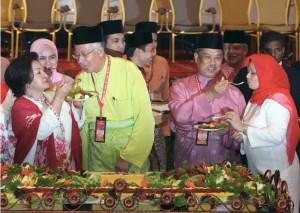 FOURTHLY, the level of infighting within the BN has reached critical levels. Most of this infighting in Peninsular Malaysia has taken place behind closed doors. But it cannot be denied that one of the main reasons why Najib has postponed calling the general election is because he cannot decide on the candidate list, especially in UMNO. He wants to field fresh faces which are ‘winnable’ but the incumbents and local warlords are holding him hostage, promising to sabotage these candidates if they themselves are not chosen and threatening not to support Najib in the next UMNO General Assembly elections.
FOURTHLY, the level of infighting within the BN has reached critical levels. Most of this infighting in Peninsular Malaysia has taken place behind closed doors. But it cannot be denied that one of the main reasons why Najib has postponed calling the general election is because he cannot decide on the candidate list, especially in UMNO. He wants to field fresh faces which are ‘winnable’ but the incumbents and local warlords are holding him hostage, promising to sabotage these candidates if they themselves are not chosen and threatening not to support Najib in the next UMNO General Assembly elections.
In Sarawak, it is open warfare within nearly all the BN parties. A serious leadership struggle in SUPP, with one faction being tacitly supported by Taib (State Minister Wong Soon Koh’s faction) and another being supported by Najib (Peter Chin’s faction), this party risks losing all of its seats in the urban areas in the next general election.
In SPDP, a number of its prominent leaders have been sacked, including the MP for Mas Gading Tiki Lafe, and four state assembly representatives, because of differences with the party president, William Mawan. In PRS, the expulsion of Larry S’ng from the party by James Masing, has led to the formation of the Sarawak Workers Party (SWP) whose sole intention is to wreck the chances of PRS to retain its 6 parliament seats. The only party which has been spared from this very public infighting has been Taib’s own PBB. This peace cannot be guaranteed if Taib, for one reason or another, is no longer leading this party.
In Sabah, the mutterings of dissatisfaction towards the BN and especially against Chief Minister, Musa Aman, has led to great speculation that many BN MPs may leave the coalition. Two MPs have already taken this step – Wilfred Bumburing of UPKO and Lajim Ukim of UMNO.
Even UPKO leaders have publicly admitted that the party considered leaving the BN. The fact that Bernard Dompok, the UPKO president, did not publicly chastise Bumburing, his deputy, for leaving the party speaks volume of the sentiment within the BN in Sabah right now.
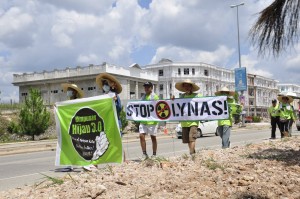 FIFTHLY, the strength of the anti-BN sentiment has been much more effectively mobilized by social movements such as BERSIH and the STOP LYNAS coalition. The unprecedented turnout for Bersih 3.0, which was arguably the largest outdoor public gathering in Malaysian history, showed the mobilizing power, appeal and ideals of BERSIH. It was probably responsible for Najib postponing the general election, which was widely expected to have been called in June or July this year.
FIFTHLY, the strength of the anti-BN sentiment has been much more effectively mobilized by social movements such as BERSIH and the STOP LYNAS coalition. The unprecedented turnout for Bersih 3.0, which was arguably the largest outdoor public gathering in Malaysian history, showed the mobilizing power, appeal and ideals of BERSIH. It was probably responsible for Najib postponing the general election, which was widely expected to have been called in June or July this year.
The momentum gathered by the environmental movement as a result of opposition against the LYNAS rare earth plant has spread to protests against the Bukit Koman gold mine as well as the massive Pengerang RAPID Oil and Gas project.
It won’t be surprising if another spontaneous coalition to protest against the implementation of the Automated Enforcement System (AES) were to be established, especially if the summons starts to pile up. All this anti-BN sentiment will be mobilized and channeled towards anti-BN votes in the next general election.
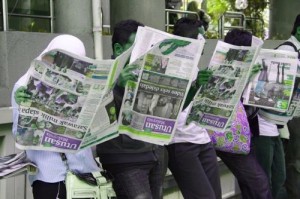 SIXTHLY, the rise of alternative and especially social media has been very effective in breaking the mainstream media monopoly. Not only have the number of news portals increased since 2008, the ability of produce and share user generated content have also increased with the increased usage of social networking sites such as Facebook, Twitter, Instagram and YouTube.
SIXTHLY, the rise of alternative and especially social media has been very effective in breaking the mainstream media monopoly. Not only have the number of news portals increased since 2008, the ability of produce and share user generated content have also increased with the increased usage of social networking sites such as Facebook, Twitter, Instagram and YouTube.
The combination of alternative media and user generated content with social networking sites means that whatever positive gains which Najib thinks he may have made through his various transformation programs can be undone by the sharing of user experiences and youtube clips showing police brutality during the Bersih 3.0 protest.
Any mistakes made by the authorities – and the BN has much more room to make such mistakes given that they are in power at the federal level – can and will ‘go viral’. Recent examples includes Minister Aziz’s denials that he doesn’t know what car his son drives because he doesn’t sleep with his son and that he has the status of a Hollywood star will not help BN’s cause.
Also, the recent photos of the wife of the Prime Minister showing her in between Lee Chong Wei and his new wife during the wedding dinner and in their family wedding portraits.
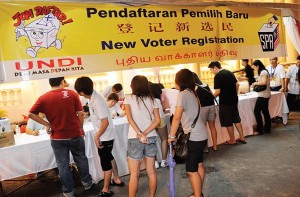 SEVENTHLY, the 3 million newly registered voters since 2008, 60% of whom are below the age of 30, will be crucial in swinging the next election in favor of PR. While Pakatan cannot take the support of younger voters for granted, it is inevitable that these voters would be much more likely than their parents and grandparents whom they have replaced on the electoral roll to cast a vote for the opposition.
SEVENTHLY, the 3 million newly registered voters since 2008, 60% of whom are below the age of 30, will be crucial in swinging the next election in favor of PR. While Pakatan cannot take the support of younger voters for granted, it is inevitable that these voters would be much more likely than their parents and grandparents whom they have replaced on the electoral roll to cast a vote for the opposition.
This new generation of voters is much less likely to be cowed by threats of another May 13th happening if BN were not given sufficient support. They are also less likely to be influenced by mainstream media because of their reliance on alternative media and social networking for their political information. It only takes another BERSIH rally which is met with another round of police brutality to convince a majority of these young voters to throw their support firmly behind Pakatan.
This does not mean that the BN will self-destruct and cease to exist if and when they lose power. The nature of the coalition may change, as it once did when the Alliance was transformed into the present day Barisan Nasional coalition. They may even end up back in power like the KMT in Taiwan and PRI in Mexico if Pakatan fails to live up to expectations.
But make no mistake, the end of BN’s continuous rule in this country is a question of when and not if. Let us make sure that this “when” occurs in the upcoming general election.
* Ong Kian Ming is a political analyst, lecturer, and DAP Election Strategist.


